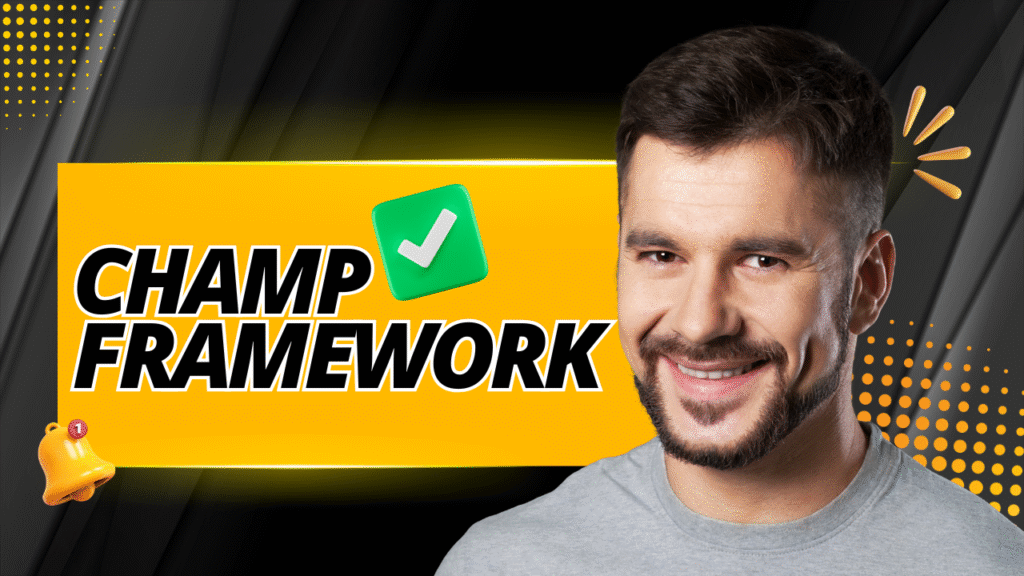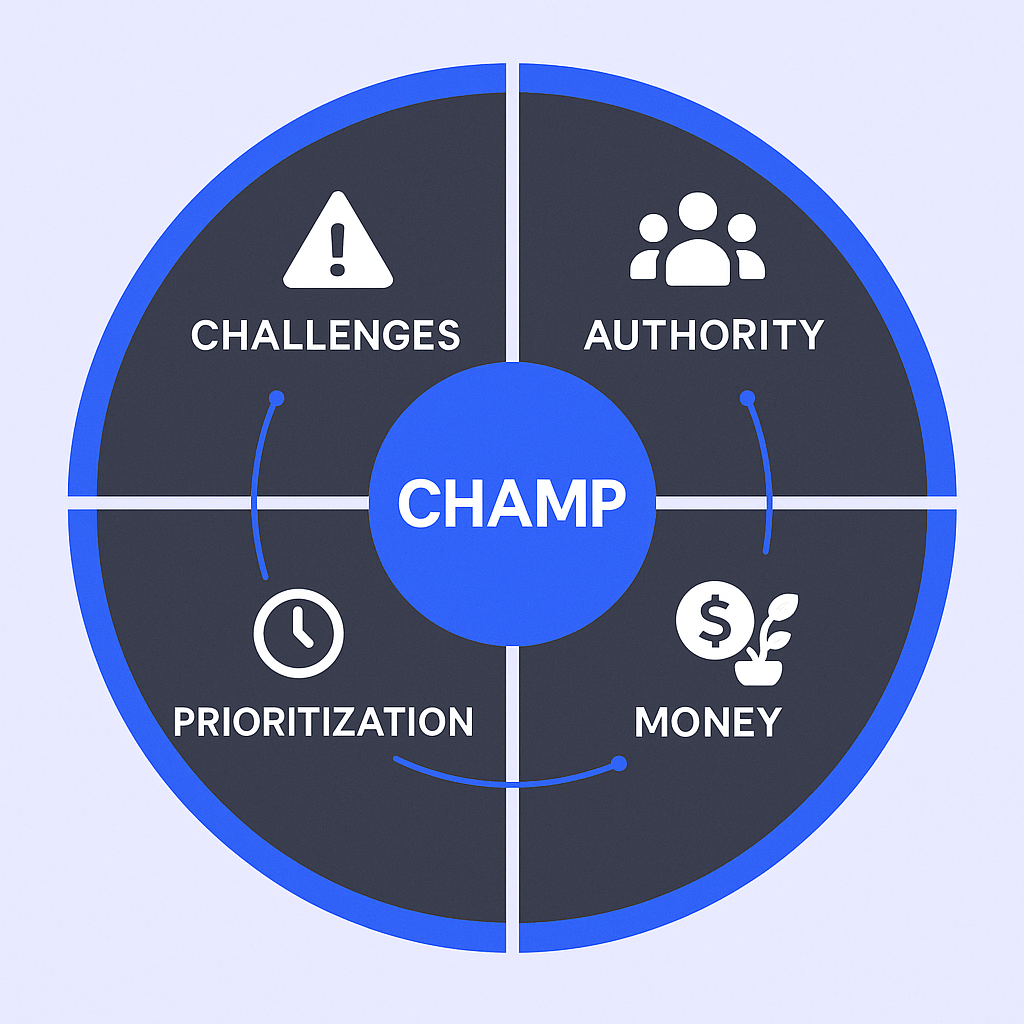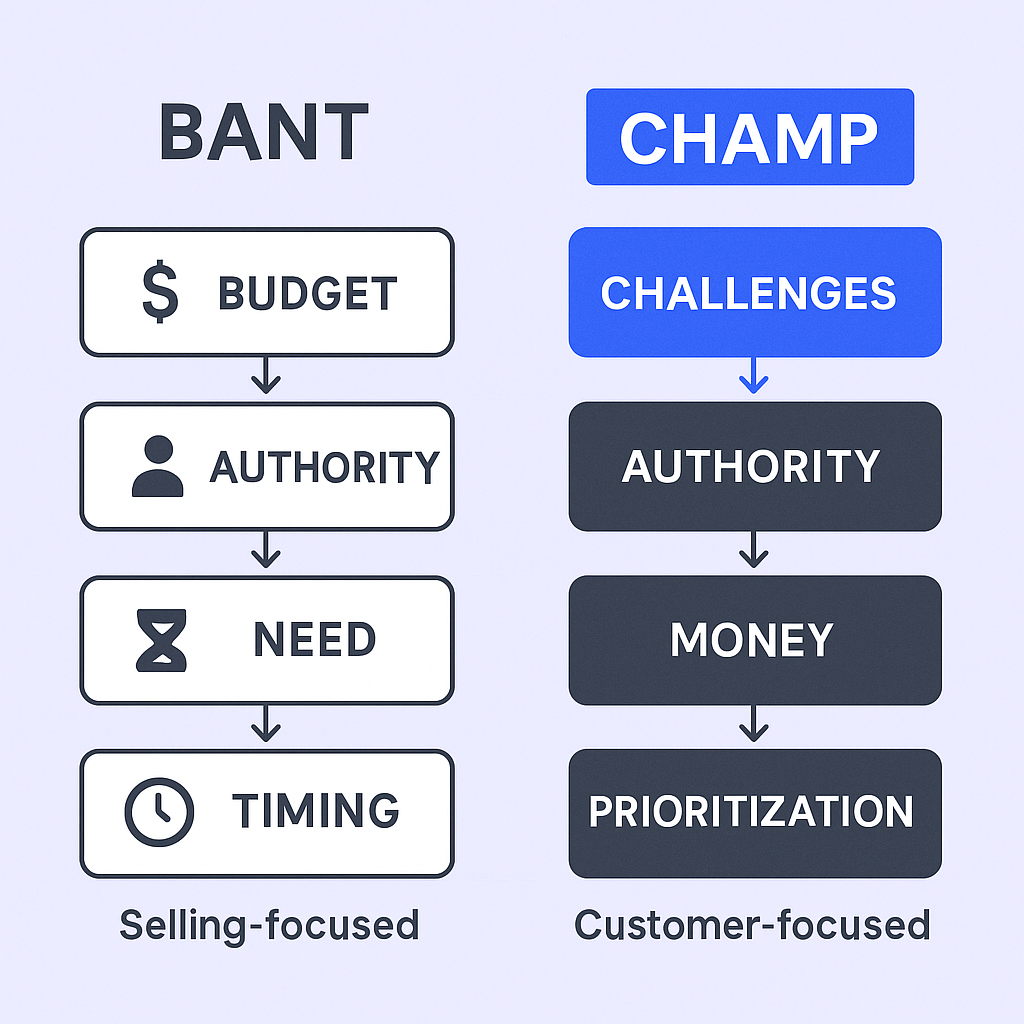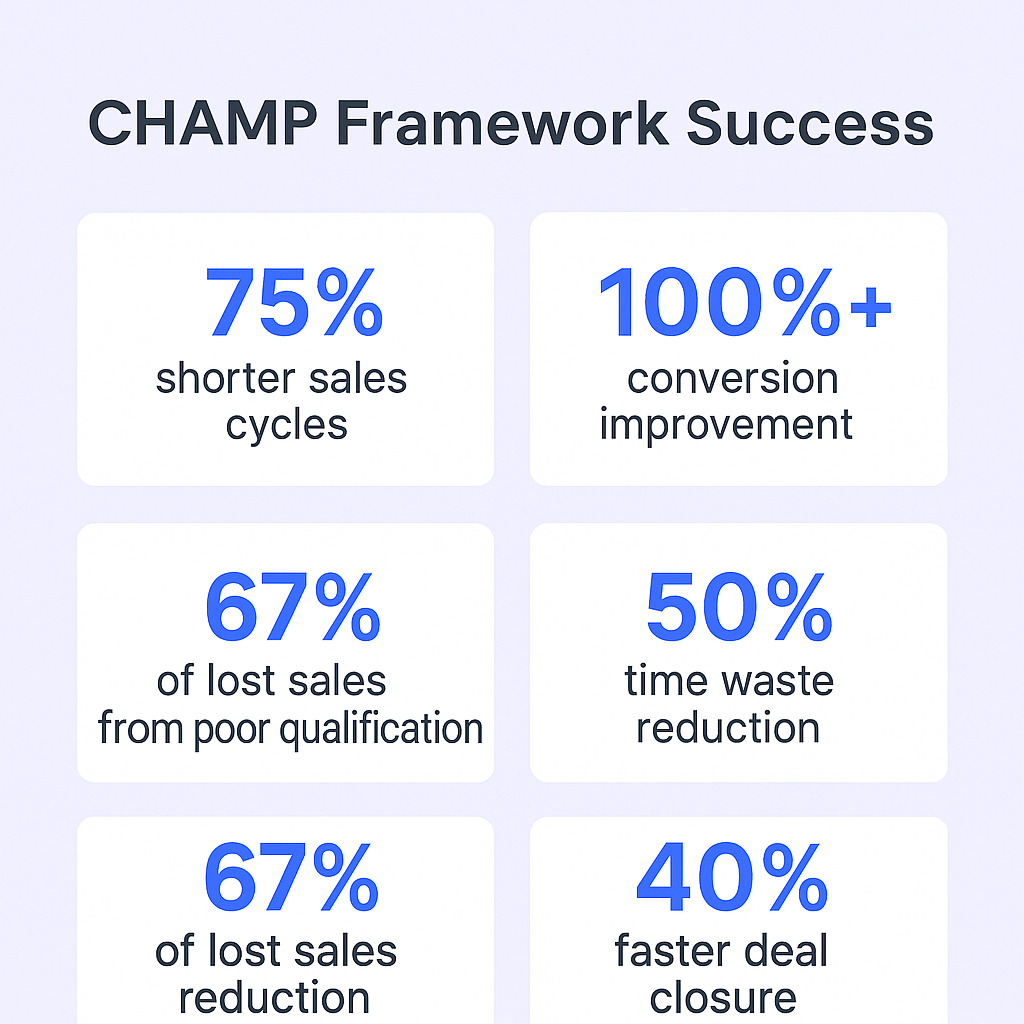- blog
- Lead Generation, Sales Development
- CHAMP Framework: Modern Lead Qualification That Actually Works

The CHAMP Framework: Your Secret Weapon for Smarter Lead Qualification
Table of Contents
Ever wonder why promising leads suddenly go cold? You’re not alone. Research shows that 67% of lost sales result from improper lead qualification – a staggering statistic that highlights just how critical effective qualification has become in today’s competitive landscape.
Enter the CHAMP framework – a customer-centric approach that’s revolutionizing how sales teams identify and convert valuable opportunities. Unlike outdated methods that focus on budget first, CHAMP prioritizes understanding your prospect’s actual challenges, creating authentic conversations that lead to faster closes and stronger relationships.
Understanding the CHAMP Framework
The CHAMP framework stands for Challenges, Authority, Money, and Prioritization – four interconnected elements that form a comprehensive lead qualification system. Introduced in 2007 by SaaS sales leader Zorian Rotenberg, this methodology emerged as a direct response to the limitations of traditional qualification approaches.
Why CHAMP is Different
What sets CHAMP apart isn’t just its structure – it’s the philosophy behind it. While traditional frameworks often start with budget discussions, the CHAMP sales framework takes a radically different approach by leading with empathy and genuine problem-solving.
This customer-first mentality aligns perfectly with modern buyer behavior. Today’s prospects are incredibly well-informed, often conducting extensive research before ever engaging with sales teams. They don’t want to be immediately grilled about their budget – they want partners who understand their world and can genuinely help solve their problems.
By prioritizing challenges pain points from the very first interaction, CHAMP creates natural, conversational flows that build trust and rapport. This isn’t just about being nice – it’s about recognizing that in our information-rich world, sales success increasingly depends on creating value, not just presenting features.
What Makes CHAMP Effective Today
The effectiveness of CHAMP in today’s market comes down to several key factors that directly address modern sales challenges:
Enhanced Qualification Accuracy: By diving deep into a prospect’s actual challenges, sales professionals can quickly identify genuine pain points and truly qualified leads. This means less time wasted on dead-end pursuits and more focus on opportunities with real potential.
Improved Deal Velocity: When core issues are addressed early in the process, decision-making accelerates naturally. Organizations implementing CHAMP have reported sales cycle reductions of up to 75% and conversion rate improvements exceeding 100%.
Stronger Relationships: By positioning sales professionals as trusted advisors rather than product pushers, CHAMP facilitates deeper, more authentic conversations that resonate with key decision-makers.
The economic impact is profound. Studies reveal that sales representatives waste up to 50% of their time on unqualified prospects. CHAMP’s ability to reduce this waste while speeding up decision-making translates directly into significant cost savings and increased revenue.
⚡ Pre-Qualify Prospects Before Outreach
LinkedIn outbound engine targets prospects with demonstrated challenges and buying authority
Key Elements of the CHAMP Framework
The CHAMP framework comprises four critical elements that work together to create a comprehensive qualification process. Let’s break down each component:
Challenges
This is where every meaningful sales conversation begins. Before discussing products or solutions, you need to understand your prospect’s current reality deeply.
The “C” in CHAMP focuses on identifying challenges pain points that are causing real problems. What specific issues are they trying to solve? What’s keeping them up at night? If you can’t identify a clear challenge, there probably isn’t a genuine sales opportunity.
Key questions that uncover challenges include:
- “What obstacles are currently preventing your team from hitting its goals?”
- “How are these issues impacting your business revenue or customer satisfaction?”
- “What have you tried so far, and why hasn’t it worked?”
- “If this problem were solved tomorrow, what would change for your team?”
The most effective approach involves digging beyond surface-level symptoms to understand root causes. For example, if a prospect mentions “low sales,” skilled professionals probe deeper: “Why are sales low? Is it lead quality? Conversion processes? Ineffective outreach methods?”
This deeper investigation shifts conversations from generic pitches to highly tailored solutions that address specific, underlying issues.
Authority
Once you understand the problem, the next critical step is identifying who has the power to actually implement a solution.
Authority in CHAMP goes beyond finding the ultimate decision-maker. It’s about mapping the entire decision-making ecosystem, including influencers, stakeholders, and internal champions who can drive the process forward.
Essential authority questions include:
- “Who else needs to be involved in a decision like this?”
- “How are decisions for new solutions typically made in your organization?”
- “What would each person’s role be if we moved forward with implementation?”
Research shows that deals close 40% faster when all key stakeholders are identified and engaged early in the process. This isn’t just about efficiency – it’s about avoiding the frustration of building momentum only to discover crucial decision-makers who weren’t part of the conversation.
Beyond direct questioning, leverage tools like LinkedIn to research company hierarchies before calls. Understanding organizational structure helps you ask better questions and position your solution more strategically.
Money
After establishing the challenge and decision-makers, the conversation naturally progresses to investment considerations.
But here’s where CHAMP differs significantly from traditional approaches. This isn’t about demanding budget figures upfront. Instead, it’s about understanding financial capacity and decision-making processes after value has been established.
The key is confirming both capacity and willingness to invest while understanding how prospects perceive the value of solving their identified challenge. This enables you to frame costs in terms of potential return on investment.
Effective money-related questions include:
- “What kind of ROI are you looking to achieve with a solution like this?”
- “Have funds been allocated for this project, or would internal approval be needed?”
- “What’s the potential cost if this challenge remains unaddressed?”
A critical distinction exists between traditional “budget” discussions and CHAMP’s “money” approach. Rather than identifying existing funds, you’re helping prospects build a business case for investment based on tangible value your solution provides.
Prioritization
Even prospects with clear challenges, proper authority, and financial capacity won’t buy if the issue isn’t a current priority.
Prioritization assesses the urgency of the prospect’s need and helps determine their implementation timeline. Understanding this urgency allows you to pace your sales process appropriately.
Key prioritization questions include:
- “How urgent is solving this challenge for your team right now?”
- “What happens if this isn’t addressed in the coming months?”
- “Are there internal deadlines or business goals tied to this project?”
- “Where does this rank among your other current initiatives?”
Be specific when discussing timelines. If someone mentions “next year,” ask “Would that be Q1 or Q2?” Closer implementation timelines typically indicate more immediate and promising opportunities.
Remember that prioritization isn’t static – it can shift due to external factors or internal pressures. This requires ongoing engagement and continuous re-evaluation throughout your sales cycle.
Stop playing email roulette Get accurate contact data now Try Today
CHAMP vs BANT: A Comparative Analysis
For decades, BANT budget authority (Budget, Authority, Need, Timing) served as the primary lead qualification framework. Developed by IBM in the 1960s, BANT provided a structured approach to qualifying prospects.
However, the fundamental difference between these frameworks lies in their orientation: BANT is seller-centric, prioritizing budget early in discussions, while the CHAMP sales framework is distinctly customer-centric, beginning conversations by exploring challenges.
BANT’s Strengths and Limitations
BANT does have notable strengths, particularly its straightforward nature and effectiveness in transactional sales with clear procurement processes. For simple, low-cost products, BANT can quickly determine lead viability.
However, BANT shows significant limitations in modern sales environments:
Transactional Feel: Its rigid, seller-focused approach can feel off-putting to contemporary buyers who expect consultative interactions.
Premature Disqualification: BANT risks disqualifying leads who may not have pre-allocated budgets but have significant needs and could secure funding if value is properly demonstrated.
Complexity Blind Spot: BANT struggles with complex, multi-stakeholder decision-making processes that characterize today’s B2B sales environment.
Why CHAMP Addresses Modern Realities
CHAMP addresses these limitations by offering greater flexibility, adaptability, and deep focus on the customer’s journey. This makes it particularly suitable for complex, consultative sales environments.
The evolution from BANT to CHAMP reflects fundamental market shifts. The 1960s featured less informed buyers and simpler, single-decision-maker purchases. Today’s buyers are highly informed, buying committees are complex, and sales cycles are non-linear.
Many successful sales teams effectively combine both frameworks, using BANT for rapid initial qualification and transitioning to CHAMP for deeper engagement with promising opportunities.
Strengths and Weaknesses of the CHAMP Framework
Like any powerful methodology, CHAMP presents distinct advantages while requiring careful consideration of potential challenges.
Key Strengths
Customer-Centric Focus: CHAMP places prospect needs at the conversation’s core, fostering genuine dialogue and positioning sales professionals as trusted advisors. This builds essential rapport and trust for long-term relationships.
Enhanced Qualification Accuracy: By thoroughly exploring challenges, CHAMP enables quick identification of truly qualified leads, significantly reducing time wasted on unproductive pursuits.
Improved Deal Velocity and Win Rates: Addressing core challenges early tends to accelerate decision-making. Organizations adopting CHAMP have witnessed sales cycles shorten by up to 75% and conversion rates improve by over 100%.
Adaptability for Complex Sales: CHAMP excels in intricate sales environments with multiple stakeholders, common in SaaS and enterprise deals where traditional methodologies often fall short.
Notable Limitations
Time and Skill Intensive: Effective CHAMP implementation requires considerable time, effort, and skill development. This involves more in-depth conversations per prospect, which can challenge smaller teams or junior representatives still developing consultative abilities.
Less Predictable Financial Discussions: While CHAMP prioritizes value, the “Money” component can be less straightforward than direct budget inquiries, requiring more nuanced discussions and detailed value justification.
Potential Over-Complication: For quick, transactional sales with minimal complexity, CHAMP’s detailed approach might be excessive, potentially slowing processes that could be managed more swiftly.
The “resource intensive” nature of CHAMP isn’t merely a drawback – it represents a strategic investment. While requiring more skilled professionals and time per prospect, the substantial benefits in conversion rates and reduced sales cycles suggest significant return on investment.
Practical Applications of the CHAMP Methodology
CHAMP isn’t just theoretical – it’s a versatile framework with demonstrable real-world impact across various industries.
SaaS Success Stories
The CHAMP sales framework is particularly well-suited for modern SaaS environments where understanding evolving customer needs and demonstrating continuous value is paramount.
Consider a cloud infrastructure company similar to Amazon Web Services. Their sales teams use CHAMP to qualify leads facing challenges with outdated on-premise systems – scalability issues, high maintenance costs, and slow innovation cycles.
By applying CHAMP, they:
- Challenges: Explore infrastructure limitations and growth plans
- Authority: Identify IT managers, finance leaders, and operations stakeholders
- Money: Help prospects calculate long-term ROI of cloud migration
- Prioritization: Align solutions with product roadmaps and digital transformation deadlines
Companies focusing on value and solving specific pain points have observed 45% decreases in cost per opportunity and 200% increases in closed won bookings.
Manufacturing Industry Implementation
Manufacturing sales often involve substantial capital expenditures and complex operational changes, making CHAMP highly effective for navigating intricate sales processes.
Consider advanced robotics solutions for factories. Sales teams use CHAMP to qualify prospects facing production bottlenecks, elevated labor costs, quality control issues, and safety concerns.
CHAMP helps them:
- Challenges: Uncover operational inefficiencies and quantify financial impact
- Authority: Engage plant managers, operations VPs, and safety officers
- Money: Quantify ROI through increased output, reduced waste, and improved safety
- Prioritization: Address competitive pressures, product launches, or compliance deadlines
One manufacturing equipment supplier reported a 47% boost in win rates within six months of adopting CHAMP, demonstrating its effectiveness in managing complex needs and shifting priorities.
Transform your lead generation Scale outreach with verified emails Get Started
Services Application
In services businesses like consulting, marketing agencies, or lead generation providers, solutions are often intangible and highly customized, making CHAMP exceptionally valuable.
Digital marketing agencies use CHAMP to qualify clients for SEO and content services by:
- Challenges: Exploring low website traffic, poor lead quality, and visibility issues
- Authority: Identifying marketing directors, sales VPs, or CEOs feeling revenue pressure
- Money: Discussing ROI of improved organic visibility against costs of inaction
- Prioritization: Aligning services with marketing goals, budget cycles, or competitive pressures
This ensures agencies pursue only clients with genuine, urgent needs and investment capacity, leading to higher satisfaction and successful long-term partnerships.
Practical Integration Tips
Integrating CHAMP into daily operations requires strategic approach:
Start Small and Scale: Begin with one team or product line to pilot CHAMP. Gather insights, then expand based on lessons learned.
Invest in Training: CHAMP requires distinct mindsets and skills. Comprehensive training with role-playing and scenario exercises develops consultative selling capabilities.
Integrate into Sales Cadence:
- First Contact: Focus on Challenges and Authority
- Follow-up: Map solutions to pain points, confirm Money alignment
- Nurturing: Gauge Prioritization and propose next steps
Embrace Continuous Improvement: Regularly review processes, identify effective questions, and adapt based on feedback and outcomes.
Leverage Technology: Use CRM systems to track CHAMP criteria, automate follow-ups, and analyze qualification accuracy.
Conclusion: Embracing Qualification Excellence with CHAMP Methodology
The CHAMP framework represents more than a sales acronym – it’s a fundamental shift toward genuinely understanding prospects and acting as problem-solving partners rather than product pushers.
For sales professionals, adopting CHAMP leads to more efficient, effective, and rewarding sales journeys. The framework delivers improved lead qualification, reduced time waste on unqualified prospects, shorter sales cycles, and higher win rates.
In today’s complex sales landscape, effective qualification isn’t just desirable – it’s the foundation of sustainable growth. By committing to CHAMP, implementing it systematically, and continuously refining your approach, you’re not just closing more deals – you’re building stronger, more valuable customer relationships that endure.
The statistics speak for themselves: 67% of lost sales stem from poor qualification, while organizations implementing CHAMP see 75% shorter sales cycles and 100%+ conversion rate improvements. In a world where 50% of sales time is wasted on unqualified prospects, mastering CHAMP isn’t optional – it’s essential for success.
Skip Unqualified Prospects Entirely
Complete LinkedIn strategy delivers CHAMP-ready leads with proven targeting and campaign frameworks
7-day Free Trial |No Credit Card Needed.
Start implementing CHAMP today. Your future self – and your sales numbers – will thank you.

CHAMP-Qualified Prospects from LinkedIn
Strategic targeting identifies decision makers with real challenges before qualification conversations
